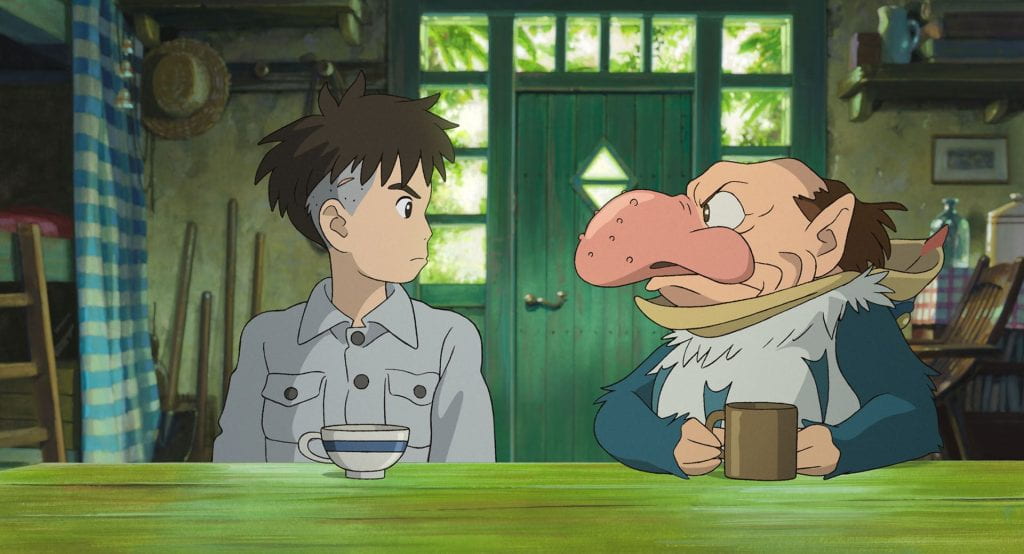Since 1988, the Center for Asia Pacific Studies has gained a reputation for conceptualizing and hosting events that promote greater understanding of the peoples and cultures of the Asia Pacific region. Our events attract diverse audiences, consisting of faculty, staff, students and members of the public from the San Francisco Bay Area and throughout the world. As the summer begins, the center is excited to share highlights from our events this past spring semester.

The Boy & the Heron: The Many Doors to Miyazaki’s Perhaps Final Fantasy
Lecture by Susan Napier, Tufts University
Wed., Feb. 7th | 5:00-6:15 PM PST | Online
The Center for Asia Pacific Studies kicked off the semester by welcoming professor Susan Napier for an online lecture on Hayao Miyazaki’s most recent film. The Japanese animation director Miyazaki released, The Boy and the Heron, his perhaps final film, in the summer of 2023. In many ways the film is a summing up of some of the most important cinematic elements of his long career, including strong female characters, memorable non-human characters and, above all, the creation of immersive worlds of beauty and fantasy. This time, however, Miyazaki anchors his fantasy within an ancient graying tower that combines elements of the gothic with the director’s long held fascination with ruins, a lost and perhaps irretrievable past, and a poignant and surprising story of love.

Lunar New Year Celebration
Thurs., Feb. 15th | 11:45 AM – 12:45 PM PST | Privett Plaza
View highlights from the celebration here »
On February 15th, we rang in the Year of the Dragon at our Lunar New Year Celebration. It was our largest celebration to date, bringing together Asia-focused programs and units on campus to share information about their programs and engage students with their Lunar New Year themed activities. Students enjoyed music, games, prizes, food, a photo booth and a traditional lion dance performance by Leung’s White Crane Association.
Curry Goes Global: The Geopolitics of Good Taste
Lecture by Krishnendu Ray, New York University
Wed., Feb. 28th | 5:00-6:15 PM PST | Online
In our next event, we welcomed Professor Krishnendu Ray for an online lecture on the history of curry. Curry was a British Indian invention that traveled through the imperial navy to end up as the Japanese curry-rice in the drive towards military modernization at the other end of the Eurasian world. This talk was about the unusual trajectory of an ersatz invention and its entanglement with geopolitical power and the biopolitics of a martial race.

The Sino-Hollywood “Courtship”
Lecture by Ying Zhu, Hong Kong Baptist University
Wed., March 20th | 5:00-6:15 PM PST | Hybrid – Fromm, Maier Rm. & Online
In March, we welcomed Professor Ying Zhu to campus to address the parallels on the evolution of the American and Chinese film industries from inception to the post-Covid era. Zhu paid special attention to the entangled Sino-Hollywood relationship against the backdrop of shifting Sino-US relations under the sway of internal domestic forces in the name of national interest, and of external global forces shaped by transnational power dynamics. Her lecture spotlighted the affective power of motion pictures for cultural influence and political persuasion as well as the economic function of the film industry.

Film Screening: Perfect Days
Tuesday, March 26th | 5:00-7:15 PM | Cowell 107
The following week, we hosted an in-person screening of the award-winning film, Perfect Days. This film follows Hirayama (Koji Yakusho), a toilet cleaner in Tokyo who finds contentment in the subtle beauty of everyday moments, like listening to music on cassette and caring for his maple saplings. As Hirayama experiences a series of unexpected encounters, Perfect Days becomes a meditation on the meaning of life well-lived, equal parts expansive and intimate.

Young Chinese Women Defying Marriage and Childrearing Pressure
Keynote: Demographic Challenges in East Asia
Wednesday, April 10th | 5:00-6:15 PM | Online
Leta Hong Fincher, author of Leftover Women: The Resurgence of Gender Inequality in China and Research Associate, Columbia University Weatherhead East Asian Institute
In April, Dr. Leta Hong Fincher to delivered the keynote lecture for our online symposium, “Demographic Challenges in East Asia.” In 2022, China’s population shrank for the first time since the famine in the early 1960s under Mao Zedong’s catastrophic “Great Leap Forward” campaign. This seismic demographic transformation was preceded by plummeting birth rates in recent years, as women in China have increasingly turned their backs on marriage and children. Through their individual choices, these women are posing a complicated problem for the Chinese Communist Party. In this talk, Leta Hong Fincher looked at what lies ahead for women’s rights in China as the government carries out a pro-natalist, pro-marriage propaganda campaign and a harsh crackdown on feminist activism.

Demographic Challenges in East Asia Symposium
Thursday, April 11th | 2:00-6:30 PM | Online
As life expectancy has risen, Asians have gotten older and now are living longer. At the same time, the number of marriages has steadily decreased, women are having fewer children and fertility is declining. East Asian nations are now facing the challenges of shrinking populations and workforces and aging populations with fewer young people to support them. What are the key factors driving Asia’s demographic challenges? What are the consequences of these challenges and how have Asian nations and their citizens responded? What can we learn from their attempts and experiences? What pathways and policies have worked historically and how might they be applied to the current situation today? These are some of the questions our speakers answered through their presentations. Our speakers included Mina Marković ( University of Cambridge), Fumiya Uchikoshi (Princeton University), Feng Wang (University of California, Irvine), Sunhye Kim (Ewha Womans University), Kai-Yu Chiu (Johannes Gutenberg-Universität Mainz), and Elizabeth LaCouture (University of Hong Kong). You can learn more about our past agenda here »

Innovative Histories: Labor & Technology in Japan’s Modern Mobility Regime
Lecture by Kate McDonald, University of California, Santa Barbara
Thurs., April 25th | 5:00-6:15 PM | Hybrid – Fromm, Berman Rm. & Online
Towards the end of April, we welcomed Professor Kate McDonald to address how humans have powered transport. Humans powering transport is as true for the twenty-first century as it is for the early twentieth. Look no further than the parcel delivery workers sprinting up and down apartment-building staircases. Despite the continuity of human power, explicitly human-powered technologies such as the rickshaw symbolize Japan’s past while the promise of automated transport systems such as delivery drones symbolize Japan’s future. Why? From human-powered railways to trucking to parcel delivery, this talk shows that successful innovations are often those that find new ways to incorporate human power. McDonald argued that we need a new history of innovation to account for the persistence of human power in Japan’s past and present, and to understand the role of human power in Japan’s future.
“I Survived the Atomic Bomb”: Pedro Arrupe’s Japan
Lecture by James Stone Lunde, University of San Francisco
Wed., May 1st | 5:00-6:15 PM | Hybrid – Fromm, Maraschi Rm. & Online
For our final event of the semester, we welcomed our Kiriyama Fellow Dr. James Stone Lunde to give a talk on Pedro Arrupe’s experience surviving the atomic bomb. Pedro Arrupe SJ was a Spanish member of the Society of Jesus stationed in Hiroshima when the Americans dropped their first atomic bomb on the city. In the immediate aftermath of the attack, Arrupe converted his mission into a makeshift clinic in order to help Japanese civilians injured by the blast. Upon his return to Spain, Arrupe compiled his experiences into a memoir entitled Yo viví la bomba atómica. In this book, Arrupe outlines the history of Japan, describes the Jesuit mission in Japan, then details his activities in Imperial Japan prior to the outbreak of the Pacific War, and then his experiences surviving and providing succor after the atomic strike. This talk covers the history of the Jesuit mission in Japan from the sixteenth to the twentieth centuries, and introduces Arrupe’s remarkable memoir of humanitarian and spiritual work in the midst of apocalyptic war.
If you would like to support these events, please donate here.
